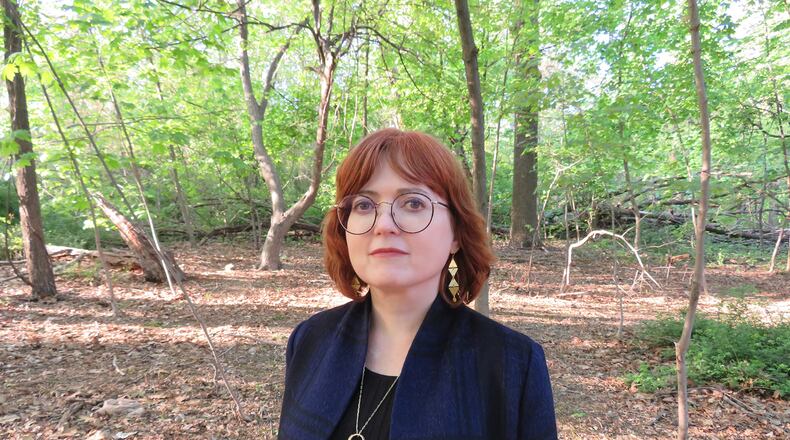“It’s difficult to heal intergenerational trauma if we don’t understand how it began,” writes Maud Newton in “Ancestor Trouble: A Reckoning and a Reconciliation.” In her unruly memoir and scholarly pursuit, Newton documents her family’s unhappy past — the alcoholism, violence and insanity — and struggles to “make amends” for the ancestral crimes of slavery and Native American removal that she uncovers during the course of her genealogical investigation.
“It’s one thing to acknowledge bigotry and inhumanity where we expect it,” she says. “It’s another thing to face and acknowledge it in the people we love most.”
Texas-born, a “tiny, waifish, spectral child,” Newton was raised in a troubled Miami household by parents who suffered from an American malady known as crazy. Her father was a lawyer who believed in slavery, for real. (Newton recalls that he smashed the heads off of her dolls because their plastic complexions were a shade too dark.) His decision to marry Newton’s mom was based on a desire “to have smart children together,” she writes. Newton hasn’t spoken to him in over 10 years.
Her mother, Sandy, with whom Newton still has a close relationship, became “a tongues-speaking fire-and-brimstone variety” preacher, who rode herd over thunderous living room exorcisms. (She once attributed Maud’s breathing difficulties to an “asthma demon.”)
In what has to be the most extravagant single-day, serial suicide attempt in recorded history, Sandy jumped from a third floor into a dumpster, then tried to drown herself in a lake — twice — before tossing back a cocktail of sleeping pills and lithium, chased with iodine.
Newton, who knew nothing of this 1969 episode because it happened before she was born — threatened to hurl herself out of a window during college over a spat with a boyfriend. She concedes that, at the time, she was prone to “barn-burner rages” as a by-product of her dysfunctional upbringing. In moments of self-awareness, she began to consider the possibility of behavioral continuities within her lineage, which had always been veiled in secrecy.
Newton understood the physical characteristics she shared with her relatives, e.g., her cherished Granny’s bad posture, or “hunch.” But, she wondered, “Beyond environment, were all of us who came from this tangle of acrimony and mental illness — also struggling against something innate?” Was there, as Granny said, something “hiding in my blood”?
So begins Newton’s two-decade quest, using the genealogy websites 23andMe and Ancestry.com, plus extensive archival research, to build her contorted family tree. Subsequently, “Ancestor Trouble” becomes a vast, captivating melodrama spanning centuries and stuffed with character sketches that are tragic and stupefying. (The book has a wonderful family album identifying many of the players.)
Credit: Handout
Credit: Handout
Newton’s maternal grandfather was a Dallas dress cutter who was overly fond of alcohol; one of his 13 wives shot him in the gut, perhaps a little high of the mark. A great-grandfather killed a close friend with a “hay hook” and ended his days in a “mental institution.” (Newton locates his unmarked grave and arranges for a headstone.)
A glamorous great-aunt paraded down the street naked and, later, “pulled a knife on her mother in the bathtub.” She died in the North Texas Lunatic Asylum. Going further down the rabbit hole, Newton’s ninth great-grandmother, a self-reliant 17th century Puritan, was charged by Boston patriarchs with “[entering] into familiarity with the Devil.”
Wide learning and roving speculation distinguish “Ancestor Trouble.” From Pythagoras to Mendel, Newton moves this way and that, exploring over two millennia of genetic speculation and experimentation before the breakthrough of human genome mapping in 2000. She also covers recent developments in the field.
As an erstwhile attorney, Newton’s conclusions regarding the nature vs. nurture debate are finely composed: “Current science tells us that depression, bipolar disorder and schizophrenia are at least partly hereditary,” but “even the most comprehensive efforts to pinpoint a gene that dictates mental health characteristics haven’t been successful in a productive sense.”
Cautiously, however, she allows herself some wiggle room: “I do believe in patterns across generations that seem nearly supernatural in their virulence.”
Which brings her to a harsh reality: “To this day, whenever I try to add up all the human beings my ancestors subjugated on this continent … the number is in the hundreds, if not thousands,” she writes.
She’s crestfallen to learn that her great-great aunt in Mississippi, Maude Newton, whose forename the author assumed because she was a writer, expressed segregationist sympathies in newspaper columns in the ‘60s. Newton recovers from this blow and concludes: “As the world shows more clearly every day, pretending racism doesn’t exist doesn’t make it go way. Giving myself her name deepened and sharpened a reckoning I knew from my youngest years was inevitable.”
Normally a skeptic, always tenacious, Newton finds a pathway out of her despair, hoping to make peace with her remote family past through meditation and “ancestor veneration” practices, which she discusses at length.
“Somehow, I had to escape my agnosticism and my intellectual searching. I needed to find an entry point through my heart.”
In “Ancestor Trouble,” the Western scientific tradition collides with near-mystical inquiry. If only imperfectly, she admits, Newton endeavors to maintain the two as one, even if it means walking through a looking glass: “Over the course of our lives, in our own mirrors, we encounter many people who come before us. The past and present blur in our very being; the divide between living and dead becomes porous.”
NONFICTION
“Ancestor Trouble: A Reckoning and a Reconciliation”
by Maud Newton
Penguin Random House
400 pages, $28.99
About the Author
The Latest
Featured



